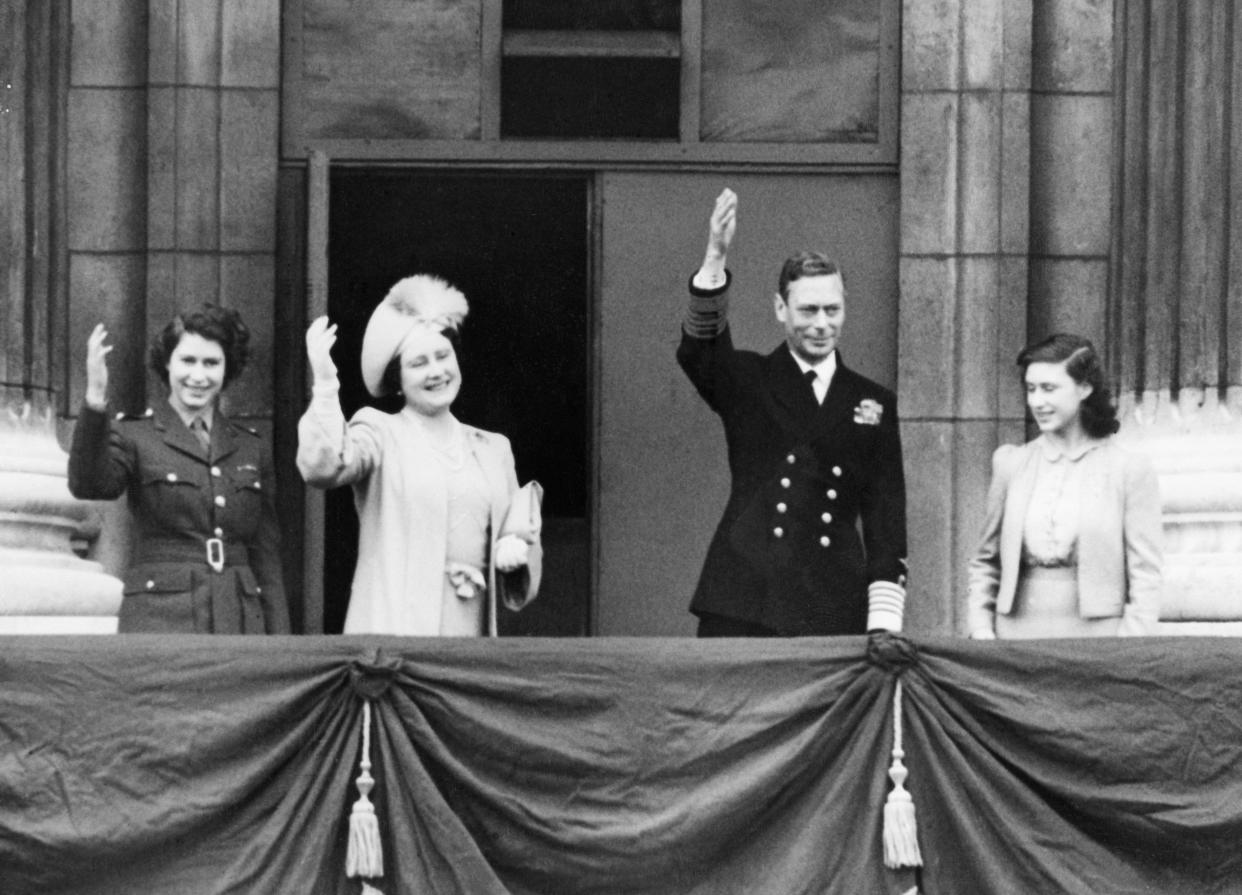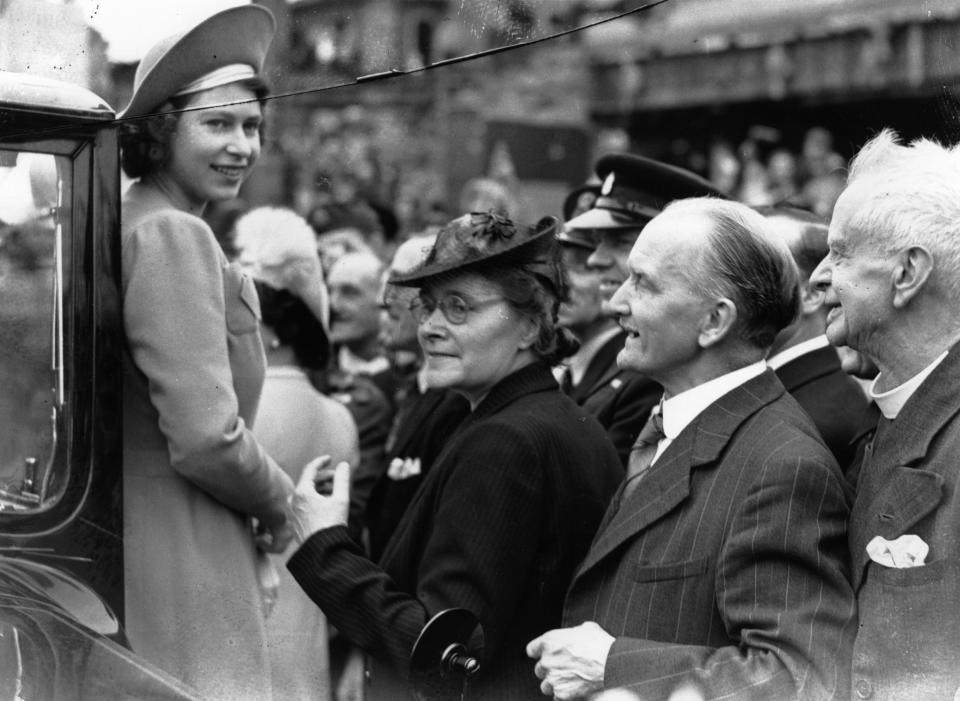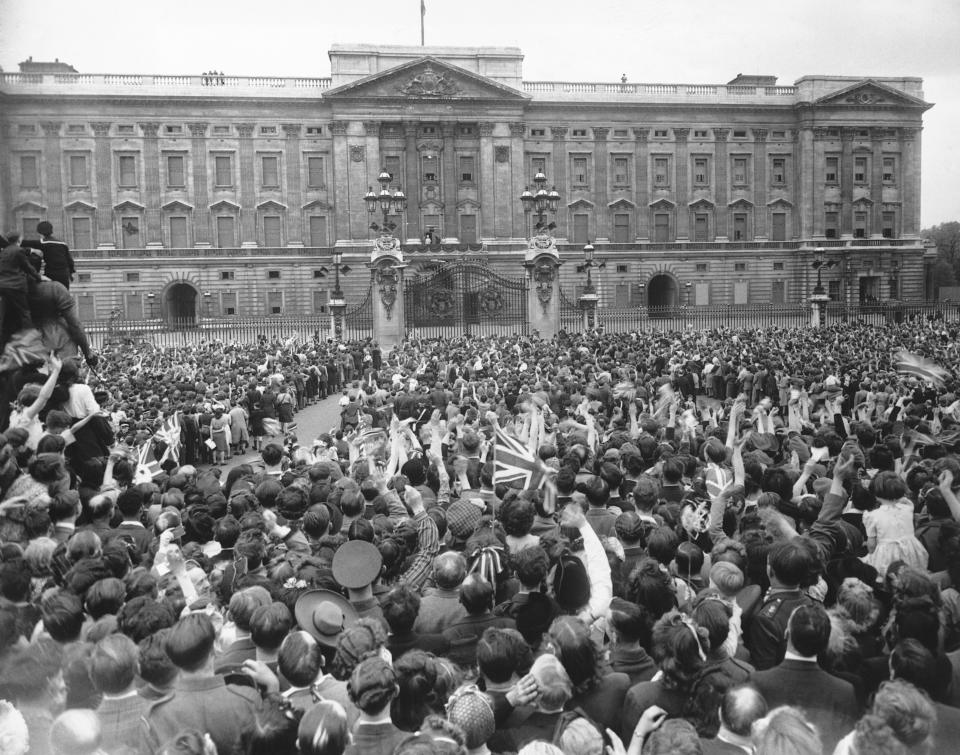Will the inspiration for the Queen's VE Day speech be her father's words?

Queen Elizabeth II will give her third broadcast of the coronavirus period as she marks the 75th anniversary of VE Day with a speech on Friday evening.
The speech, which will be pre-recorded in Windsor Castle, will be broadcast at 9pm on 8 May, 75 years to the minute since her father delivered his broadcast when the Second World War was over.
The Queen touched on her memories and experience of wartime a few weeks ago, when she delivered a broadcast to the nation and the commonwealth as the world tackles COVID-19.
She drew on the lyrics of wartime favourite Dame Vera Lynn when she reassured the country ‘We’ll meet again’ - and she might draw on inspiration closer to home in this address.
King George VI’s speech may have been about the end of the war, but there are a surprising number of themes which could apply to life in the coronavirus pandemic.
In 1945, King George VI delivered the message from “war-battered” London. In 2020, the Queen will deliver the message from Windsor, but with one of the highest death tolls in the country, London may well feel war-battered.
Read more: How the Queen became a symbol of stability in the chaos of coronavirus
His message continued: “Let us remember those who will not come back, their constancy and courage in battle, their sacrifice and endurance in the face of a merciless enemy: let us remember the men in all the Services and the women in all the Services who have laid down their lives.”
In 2020, those words will apply to those who have died from COVID-19, and all those who worked on the frontline to treat them.
In 1945, King George VI pondered what it was which kept the nation going. While the UK endured six years of war, it has so far battled through seven weeks of lockdown with no clear idea of how long it will continue.
He said it was “the knowledge that everything was at stake: our freedom, our independence, our very existence as a people” which kept the country going.
He and his wife, Queen Elizabeth, (who became the Queen Mother after her husband’s death in 1952), stood shoulder to shoulder with Londoners who were bombed out during the Blitz, and he touched on that in his message saying “we are proud to have shared some of these ordeals with you”.

Read more: VE Day in colour: Amazing images show end-of-WWII victory celebrations ahead of 75th anniversary
Similarly, the Queen has faced the uncertainty of her son, Prince Charles, being diagnosed with COVID-19, and has been in lockdown with the rest of the nation.
She celebrated her 94th birthday in lockdown, and cancelled the usual gun salutes which mark her real birthday each year.
She has also been separated from family, with her children, grandchildren and great-grandchild spread across the world, and unable to visit her.
King George VI turned to the future as he finished his speech, and said: “Let us turn our thoughts on this day of just triumph and proud sorrow; and then take up our work again, resolved as a people to do nothing unworthy of those who died for us and to make the world such a world as they would have desired, for their children and for ours.”
Surely a sentiment shared by many once lockdown lifts, and life returns to a version of normal.

Read more: Queen’s personal message to Captain Tom Moore revealed in 100th birthday card
The Queen’s message will be broadcast at 9pm, followed by a nationwide singalong of Dame Vera Lynn’s We’ll Meet Again.
In full: King George VI’s speech on VE Day, 1945
Today we give thanks to Almighty God for a great deliverance. Speaking from our Empire’s oldest capital city, war-battered but never for one moment daunted or dismayed – speaking from London, I ask you to join with me in that act of thanksgiving. Germany, the enemy who drove all Europe into war, has been finally overcome. In the Far East we have yet to deal with the Japanese, a determined and cruel foe. To this we shall turn with the utmost resolve and with all our resources. But at this hour, when the dreadful shadow of war has passed from our hearths and homes in these islands, we may at last make one pause for thanksgiving and then turn our thoughts to the tasks all over the world which peace in Europe brings with it.
Let us remember those who will not come back, their constancy and courage in battle, their sacrifice and endurance in the face of a merciless enemy: let us remember the men in all the Services and the women in all the Services who have laid down their lives. We have come to the end of our tribulation, and they are not with us at the moment of our rejoicing. Then let us salute in proud gratitude the great host of the living who have brought us to victory. I cannot praise them to the measure of each one’s service, for in a total war the efforts of all rise to the same noble height and all are devoted to the common purpose. Armed or unarmed, men and women, you have fought, striven, and endured to your utmost. No one knows that better than I do; and as your King I thank with a full heart those who bore arms so valiantly on land and sea, or in the air; and all civilians who, shouldering their many burdens, have carried them unflinchingly without complaint.
With those memories in our minds, let us think what it was that has upheld us through nearly six years of suffering and peril. The knowledge that everything was at stake: our freedom, our independence, our very existence as a people; but the knowledge also that in defending ourselves we were defending the liberties of the whole world; that our cause was the cause not of this nation only, not of this Empire and Commonwealth only, but of every land where freedom is cherished and law and liberty go hand in hand. In the darkest hours we knew that the enslaved and isolated peoples of Europe looked to us; their hopes were our hopes; their confidence confirmed our faith. We knew that, if we failed, the last remaining barrier against a world-wide tyranny would have fallen in ruins. But we did not fail. We kept our faith with ourselves and with one another; we kept faith and unity with our great allies. That faith and unity have carried us to victory through dangers which are times seemed overwhelming.
So let us resolve to bring to the tasks which lie ahead the same high confidence in our mission. Much hard work awaits us, both in the restoration of our own country after the ravages of war and in helping to restore peace and sanity to a shattered world. This comes upon us at a time when we have all given of our best. For five long years and more, heart and brain, nerve and muscle have been directed upon the overthrow of Nazi tyranny. Now we turn, fortified by success, to deal with our last remaining foe. The Queen and I know the ordeals which you have endured throughout the Commonwealth and Empire. We are proud to have shared some of these ordeals with you, and we know also that together we shall all face the future with stern resolve and prove that our reserves of will-power and vitality are inexhaustible.
There is great comfort in the thought that the years of darkness and danger in which the children of our country have grown up are over and, please God, for ever. We shall have failed, and the blood of our dearest will have flowed in vain, if the victory which they died to win does not lead to a lasting peace, founded on justice and established in good will. To that, then, let us turn our thoughts on this day of just triumph and proud sorrow; and then take up our work again, resolved as a people to do nothing unworthy of those who died for us and to make the world such a world as they would have desired, for their children and for ours. This is task to which now honour binds us. In the hour of danger we humbly committed our cause into the Hand of God, and He has been our Strength and Shield. Let us thank Him for His mercies, and in this hour of Victory commit ourselves and our new task to the guidance of that same strong Hand.

 Yahoo News
Yahoo News 

